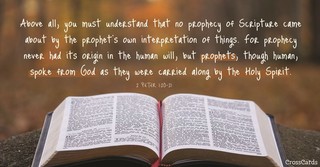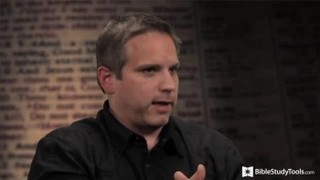
- Recent Translations
- All Translations
2 Pietro 1:12-21
Share
Settings
2 Pietro 1:12-21 Meaning and Commentary
INTRODUCTION TO 2 PETER
Though there was, among the ancients, a doubt concerning the authority of this epistle, which is first mentioned by Origen {a}, and afterwards by Eusebius {b} and Jerom {c}, yet it prevailed not among the churches, nor hindered the diligent reading and use of it, together with other Scriptures; it appearing to be useful and profitable, as Eusebius declares; and in process of time this doubt was entirely removed, and it was universally received by fathers and councils into the canon of the Scriptures, where it is justly retained, it having plain signatures of its divine original. Nor is there anything in it unworthy of so great an apostle, whose name it bears; but the whole of it is agreeable to the analogy of faith, to the rest of the sacred writings, particularly to the epistle of Jude, between which, and the second chapter of this, there is a great likeness. The only reason of the doubt of the genuineness of this epistle, and whether it was written by the Apostle Peter, is the difference of its style from the former; but the Holy Ghost, the dictator of the sacred writings, is not limited to a man's natural style, but could vary it as he pleased: besides, a man's style is not the same at different times, and when writing on different subjects; add to which, that this objection can only regard the second chapter, for the first and third agree with the former epistle. And some have thought that the second chapter is an extract out of some ancient Hebrew book, describing the characters of the old false prophets; which book Peter and Jude having before them, took the characters of the old prophets, and, under divine direction, applied them to the false teachers of the present age; and if so it is not to be wondered at that the style of the epistle should differ from the former, and even from itself in this part. But that it was written by the Apostle Peter, not only the inscription shows, which, if false, would indeed discredit the genuineness of the book, but the account that is given of the writer of it, as one that was with Christ at his transfiguration, 2Pe 1:16-18. Now there were only the three following disciples there, Peter, John, and, James. The last of these had been dead some time when this epistle was written, and it was never ascribed by any to the Apostle John, and therefore it remains that Peter must be the writer of it. As for Simeon, bishop of Jerusalem, that succeeded James, whom Grotius would suggest as the author of it, the character does not agree with him; he was not with Christ on the holy mount, nor heard the voice from heaven, asserting the sonship of Christ, and the divine complacency in him: moreover, this epistle is called a "second epistle", 2Pe 3:1 and supposes a first, and manifestly refers to the former epistle of Peter's, about which there never was any doubt, as the authors before mentioned observe. It was written by the apostle in his old age, when upon the decline of life, just as he was about to put off his tabernacle, 2Pe 1:13-15 a little before his martyrdom, in the year 68, though Dr. Lightfoot places it in 66; and it is sent to the same persons as his first, namely, to the believing Jews scattered throughout several parts of Asia, he being the minister of the circumcision; see 1Pe 1:1 compared with 2Pe 3:1. The scope and design of it are, to put them upon a concern for a larger increase of grace and spiritual knowledge; to confirm and establish them in the present truth of the Gospel; to warn them against false teachers, which he largely describes; and he puts them in mind of the dissolution of all things, and of what will precede and follow it; from whence he draws several useful hints and inferences.
{a} Apud Euseb. Eccl. Hist. l. 6. c. 25. {b} Ib. l. 3. c. 3. 25. {c} Catalog Script. Eccles. sect. 2.
\\INTRODUCTION TO 2 PETER 1\\
In this chapter, after the inscription and salutation, the apostle takes notice of gifts of grace bestowed; and exhorts to the exercise of holiness and good works; and gives the reasons why he was so pressing to them; and endeavours to establish the saints in the Gospel that had been preached among them. In the inscription, the writer of the epistle describes himself by his names, the one given him by his parents, the other by his Lord and master, and by his character and office; and the persons to whom he writes are described as having faith, and that of the same kind with the apostles, and which they obtained through the righteousness of Christ, 2Pe 1:1. The salutation is the same with that in the former epistle, only here is added a wish for an increase of divine knowledge, 2Pe 1:2 and which might be expected, since, by the power of living grace, everything necessary to a spiritual and godly life bad been given them in the effectual calling, through the knowledge of Christ; even exceeding great and precious promises, whereby they partook of the divine nature, and escaped the vices which prevailed in the world, 2Pe 1:3,4 upon which he exhorts not to rest where they were, but to go on in the exercise of grace, and performance of duties, many of which he enumerates, 2Pe 1:5-7 to enforce which he adds several arguments, as that through an abounding in these things they would appear not to have a superficial and speculative knowledge of Christ, 2Pe 1:8 or otherwise it would be evident that they were blind and ignorant, and in an unrenewed state, 2Pe 1:9 whereas by these things they would make their calling and election sure and manifest to men, and would never fall totally and finally, and in the issue have an abundant entrance into the everlasting kingdom of Christ, 2Pe 1:10,11 and then he gives the reasons of his conduct, why he so much urged a regard to these things, and put them in mind of them; namely, the usefulness of them for their establishment, the duty of his office, which required it, the short time he had to live, and the profitableness of such exhortations to them, after his decease, 2Pe 1:12-15 and in order to establish them in the truths of the Gospel, and particularly in that which concerns the coming of Christ in power and glory, on which he enlarges in the latter part of this epistle; he observes, that this was not a cunningly devised fable, but was what he and others were eyewitnesses of, even of that which was an emblem and pledge of it; namely, the transfiguration of Christ on the mount, when they saw the glory he received from God his Father, and heard the voice from heaven which declared him to be his well beloved Son, 2Pe 1:16-18, and besides, they had a surer proof of the certainty of his coming; namely, the prophecies concerning it, which should be regarded and given heed to, being as a lamp to direct in the present state of darkness and imperfection, until the illustrious day of Christ's coming appears, 2Pe 1:19 and the rather this should be attended to, since no scriptural prophecy is an invention and device of men; nor was it formerly given out at the pleasure of men, but by saints, who were influenced and moved unto it by the Holy Ghost, 2Pe 1:20,21.

